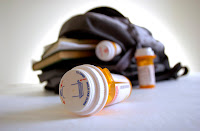I was asked to say a few words about drug use, but not in the positive. Well darn-it, how could I resist? I’m guessing the request comes on the heels of my most recent posts on medical marijuana, of which I make no secret that I am in favor. But I wish to be very clear that my views on medical marijuana are not a condonation of recreational or irresponsible drug use. On the contrary, it’s precisely because I am so against the irresponsible and dangerous use of drugs that I advocate medical marijuana. When compared to the heavy-duty narcotics and other pain pills that are doled-out indiscriminately by doctors, believe me, medical marijuana is a blessing.
First and foremost, I am a former drug abuser, so I full well know what it means to be addicted. And I also know the down-side to heavy and/or long-term drug use. I have done it all, you name it, but alcohol and cocaine were my main weaknesses. I was also addicted to nicotine. For twenty years I smoked a pack a day.
 My experience with drugs and alcohol were not all bad, though–I certainly learned a lot. If nothing else I came to understand how drugs can consume your life, how they can distort your view of the world, and how they could damage relationships. I got to experience how they could kill your motivation and prevent you from achieving your full potential. I was also exposed to a dangerous, seedy side of life that was full of mistrust, deceit, theft and violence, not to mention legal ramifications that could end a life of freedom by landing you behind bars for a long time. Yeah, lots of disadvantages to drugs; but for me it was a valuable education that will probably serve me, and hopefully others, for the rest of my life.
My experience with drugs and alcohol were not all bad, though–I certainly learned a lot. If nothing else I came to understand how drugs can consume your life, how they can distort your view of the world, and how they could damage relationships. I got to experience how they could kill your motivation and prevent you from achieving your full potential. I was also exposed to a dangerous, seedy side of life that was full of mistrust, deceit, theft and violence, not to mention legal ramifications that could end a life of freedom by landing you behind bars for a long time. Yeah, lots of disadvantages to drugs; but for me it was a valuable education that will probably serve me, and hopefully others, for the rest of my life.
Despite medical marijuana being classified a schedule 1 controlled substance—high potential for abuse, lack of accepted safety for use of the drug or other substance under medical supervision, and no currently accepted medical use in treatment in the United States (not entirely true, but that’s the definition)—it does have definite benefits. In my lifetime, I have seen it help HIV+ men keep from wasting away by giving them an appetite when they had none. I have seen it help cancer patients. One elderly couple, who are in their 90s, and whom I treat chiropractically, have shared their stories with me about the unrelenting pain they feel on a daily basis due to the cancer they each have; and how not even the Fentanyl* patches their doctors put them on would bring relief. Only medical marijuana did that. That’s right—these people in their 90s could only find relief from the intense pain they felt 24/7 by smoking a joint. They were not hippies; they had never had marijuana in their lives until they were sick with cancer. And it helped them. Duh!
Listen, drugs in and of themselves are not bad. They are helpful, even necessary, in many instances. I’ve needed the help of pain killers. An attack of acute appendicitis in 2006 showed me just how useful morphine could be (although not 100% effective and highly addictive). Whether antibiotics, sedatives, pain meds or steroids, each has a short-term use; but too many doctors give them to people long-term, as an easy yet temporary fix, instead of looking for real, long-term and self-directed solutions. And it’s this that leads to serious problems.
Let me ask you a question. What do the following people have in common:
- Jimi Hendrix, John Belushi, Sid Vicious, River Phoenix and DJ AM?
- Elvis Presley, Keith Moon, Anna Nicole Smith, Heath Ledger and Michael Jackson?
















